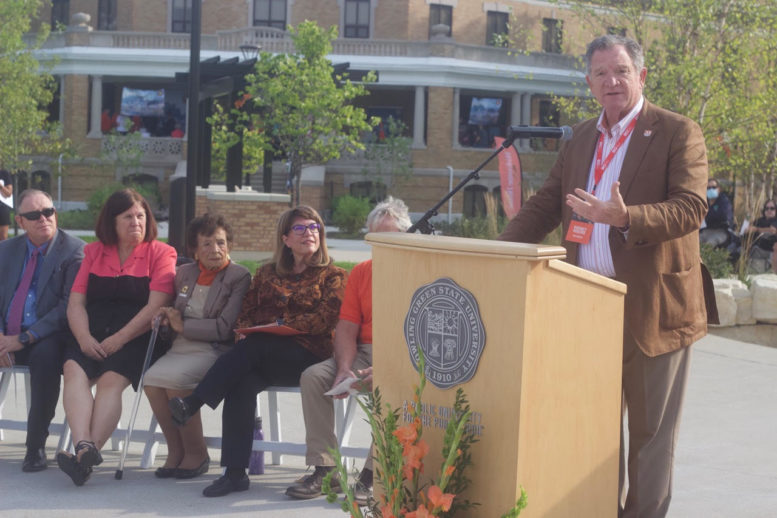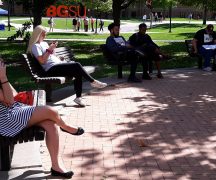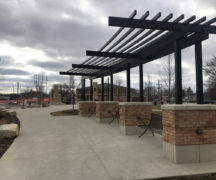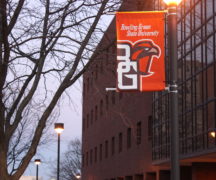By DAVID DUPONT
BG Independent News
The BGSU Board of Trustees granted a 2.75 percent pay increase to President Rodney Rogers.
The raise brings his salary to $512,500. Trustees also gave him a $100,000 performance bonus, which he said he would donate in turn to the university Foundation. Also, in the compensation package was $50,000 in deferred compensation.
The raise is in line with what other university employees have received.
In granting the compensation the trustees cited “significant contributions” he has made to the university in the past year.
Those included: rolling out new programs and partnerships, including the Doctor of Physical Therapy, manufacturing engineering, and the Center for Advanced Manufacturing; completion of the comprehensive fundraising campaign that raised $255 million; launch of a new marketing campaign; a heightened focus on health and well-being through the Community of Care initiative; and achieving enrollment goals.
Rogers said he appreciated the board’s vote of confidence and credited them for their focus on student success. He also credited his colleagues at the university for the success the university has achieved.
During the morning committee meeting, Vice President for Enrollment Management Cecilia Castellano reported to the board on an increase of 7 percent in the number of first year students to 3,244 as of the 15thday of the semester.
The university, however, is still suffering a hangover from smaller classes enrolled during the previous two years. The actual number of students of students, undergraduate and graduate, including Firelands is down by about 800 students, or 4 percent.
Traditional graduate students on the main campus, for face-to-face and hybrid programs, was the only program that increased, up 2 percent . That reflects, Castellano said, the first class of students in the hybrid doctorate in physical therapy program. About 100 students enrolled in that program.
Graduate e-campus and distance programs dropped 11 percent, but Castellano noted, that about 200 students graduated. They had enrolled during the pandemic when they were home and had more time. Those programs still had 1,290 students compared to 825 pre-pandemic in 2019.
Retention, however, fell to 77 percent stalling BGSU movement toward its goal of 80 percent retention. Vice Provost for Academic Affairs Glenn Davis said this is a result of moving out of a period when such moves as offering more pass-fail options to help students keep connected.
The university is taking a number of steps to increase its first year retention rate.
The university’s focus on Life Design, Davis said, is crucial to this. The initial focus is helping students make the transition from high school to college.
The early academic alert system aimed at getting help to struggling students will also be enhanced.
Davis noted that helping students early means that they can keep their grades up and continue to qualify for merit scholarships.
The goal spelled out in the state mandated completion report is to increase four-year graduation rate for students who entered in 2019 to 52 percent, from 50 percent, and increase the six-year graduation rate for students who entered in 2017 to 64 percent.
Also at the meeting, the trustees approved a resolution adopting a “Public Policies Principles of Free Speech.”
The policies were mandated by the legislature in the last session.
The resolution reads in part: “It is not the proper role of the University to attempt to shield individuals from free speech, including ideas and opinions they find offensive, unwise, immoral, indecent, disagreeable, conservative, liberal, traditional, radical, or wrong-headed.”
It continues: “Although the University should greatly value civility and mutual respect, concerns about civility and mutual respect shall never be used by the University as a justification for closing off the discussion of ideas, however offensive, unwise, immoral, indecent, disagreeable, conservative, liberal, traditional, radical, or wrong-headed those ideas may be to some students or faculty.”
In its background information, BGSU asserts this resolution is in keeping with its founding principles.
The resolution requires the university to establish a procedure for handling violations of the resolution.
The nine principles in the resolution are:
- Students have a fundamental constitutional right to free speech.
- The University is committed to giving students broad latitude to speak, write, listen, challenge, learn, and discuss any issue, subject to division (E) of R.C. 3345.0215.
- The University is committed to maintaining a campus as a marketplace of ideas for all students and all faculty in which the free exchange of ideas is not to be suppressed because the ideas put forth are thought by some or even by most members of the institution’s community to be offensive, unwise, immoral, indecent, disagreeable, conservative, liberal, traditional, radical, or wrong-headed.
- It is for the University’s individual students and faculty to make judgments about ideas for themselves, and to act on those judgments not by seeking to suppress free speech, but by openly and vigorously contesting the ideas that they oppose.
- It is not the proper role of the University to attempt to shield individuals from free speech, including ideas and opinions they find offensive, unwise, immoral, indecent, disagreeable, conservative, liberal, traditional, radical, or wrong-headed.
- Although the University should greatly value civility and mutual respect, concerns about civility and mutual respect shall never be used by the University as a justification for closing off the discussion of ideas, however offensive, unwise, immoral, indecent, disagreeable, conservative, liberal, traditional, radical, or wrong-headed those ideas may be to some students or faculty.
- Although all students and all faculty are free to state their own views about and contest the views expressed on campus, and to state their own views about and contest speakers who are invited to express their views on the University’s campus, they may not substantially obstruct or otherwise substantially interfere with the freedom of others to express views they reject or even loathe. To this end, the University has a responsibility to promote a lively and fearless freedom of debate and deliberation and protect that freedom.
- The University is committed to providing an atmosphere that is most conducive to speculation, experimentation, and creation by all students and all faculty, who shall always remain free to inquire, to study and to evaluate, and to gain new understanding.
- The primary responsibility of faculty is to engage an honest, courageous, and persistent effort to search out and communicate the truth that lies in the areas of their competence.





